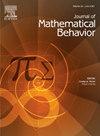有经验的证明者评估条件断言证明的操作逻辑原则
IF 1.7
Q3 EDUCATION & EDUCATIONAL RESEARCH
引用次数: 0
摘要
证明导论课程经常教授数学专业的学生逻辑原理,以支持他们以后与证明的互动。先前的研究几乎没有告诉我们学生如何在随后的理解证明的过程中利用这些原则或它们的理由。本研究调查了13名有经验的大学生在阅读条件命题证明时所采用的逻辑原则。我们还考虑它们是否以及如何证明这些原则的合理性。要求学生阅读与给定条件语句相关的各种证明有助于揭示他们对逻辑原理的关注和推理。我们发现学生的判断几乎总是逻辑规范的,但他们为这些原则辩护的准备程度差异更大。此外,我们观察到学生根据推理而不是真值来解释证明,这表明他们的操作逻辑和通常在证明课程介绍中教授的逻辑方式之间存在一些脱节。本文章由计算机程序翻译,如有差异,请以英文原文为准。
Experienced provers’ operative logical principles for evaluating proofs of conditional claims
Introduction to proof courses often teach mathematics majors logical principles to support their later interactions with proof. Prior research tells us little about how students draw upon these principles or their justifications in subsequent processes of comprehending proofs. This study investigates what logical principles thirteen experienced undergraduates employ while reading proofs of conditional claims. We also consider whether and how they justify any of those principles. Asking students to read various proofs related to a given conditional statement helped reveal their attention to and reasoning about logical principles. We found that student judgments were almost always logically normative, but their readiness to justify those principles varied more widely. Furthermore, we observe that students interpreted proofs in terms of inferences rather than truth-values showing some disconnect between their operative logic and the ways logic is generally taught in introduction to proof courses.
求助全文
通过发布文献求助,成功后即可免费获取论文全文。
去求助
来源期刊

Journal of Mathematical Behavior
EDUCATION & EDUCATIONAL RESEARCH-
CiteScore
2.70
自引率
17.60%
发文量
69
期刊介绍:
The Journal of Mathematical Behavior solicits original research on the learning and teaching of mathematics. We are interested especially in basic research, research that aims to clarify, in detail and depth, how mathematical ideas develop in learners. Over three decades, our experience confirms a founding premise of this journal: that mathematical thinking, hence mathematics learning as a social enterprise, is special. It is special because mathematics is special, both logically and psychologically. Logically, through the way that mathematical ideas and methods have been built, refined and organized for centuries across a range of cultures; and psychologically, through the variety of ways people today, in many walks of life, make sense of mathematics, develop it, make it their own.
 求助内容:
求助内容: 应助结果提醒方式:
应助结果提醒方式:


